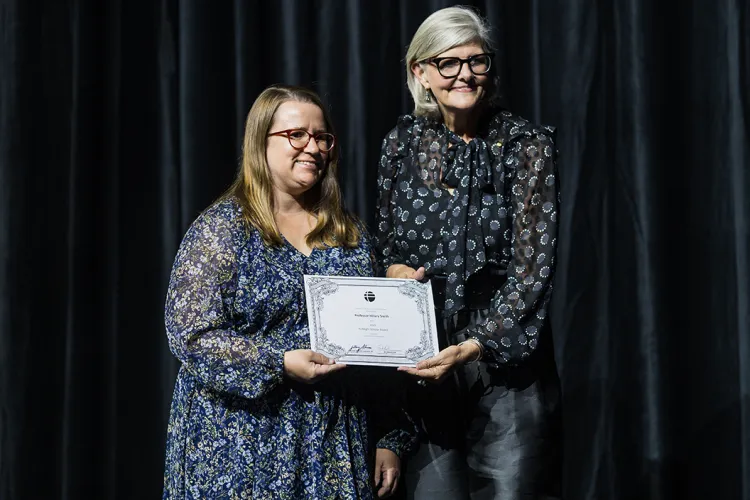Hillary Smith Begins Fulbright in Australia to Advance Battery Technology, Reduce Carbon Footprints

Smith (left) received her award from Governor General Sam Mostyn AC at a ceremony at Parliament House in Canberra, Australia.
Associate Professor of Physics Hillary Smith was selected by the U.S. Department of State and the Fulbright Program as a U.S. Scholar for 2024-2025. A specialist in the connection between microscopic material structures and their macroscopic properties, Smith addresses critical issues in electrochemical battery systems through her research.
“My project investigates next-generation sodium-ion batteries that make more efficient use of renewable energy solutions,” says Smith, “and establishes an exchange of expertise in materials discovery and characterization.”
Smith began her Fulbright in January, relocating to Australia with her family to conduct research at the University of Wollongong (UOW). At UOW’s Innovation Campus, Smith is investigating sodium-ion batteries with UOW Associate Professor Wei Kong Pang and a team of scientists.
Sodium-ion batteries offer advantages over commonly used lithium-ion batteries. They are more cost effective, safer, and carry a smaller environmental footprint. Sodium is abundant and can be harvested from saltwater, making it a viable and scalable option for energy storage.
In contrast, lithium-ion batteries, commonly found in smartphones, laptops, and electric vehicles, require the mining of rare materials that can lead to environmental degradation, air and water pollution, and loss of biodiversity. And, despite being introduced in 1991, lithium-ion battery technology has not been able to overcome critical issues like propensity to overheat or catch fire.
“I’m excited to be working with colleagues at UOW to advance alternative energy storage solutions,” says Smith. “This issue is of huge global importance, and international cooperation of scientists presents an excellent opportunity to exchange knowledge and accelerate progress.”
Smith’s research is of worldwide significance, but specifically, it is paramount to Australia. It’s a region in the world where climate change is most visible, from extensive wildfires, mass coral bleaching on the Great Barrier Reef, floods, and increased temperatures. As a major producer of lithium itself, the island is impacted by mining, including harmful dust, loss of plant life, and soil and water degradation.
By advancing sodium-ion battery technology, Smith and her colleagues hope to provide a scalable solution that strengthens global climate resilience.
Smith and other U.S. Fulbright Scholars received their awards from Governor General Sam Mostyn AC at a ceremony at Parliament House in Canberra, Australia. Despite the funding pauses in the U.S. Department of State, Fulbright Australia remains unaffected by these developments.



